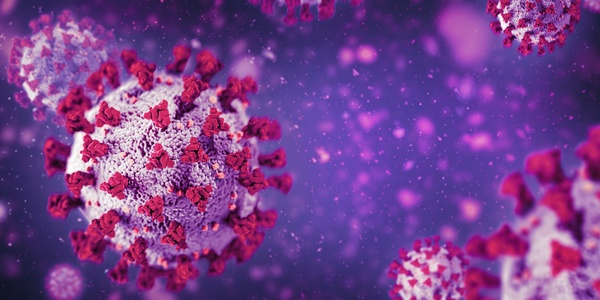A new potential treatment inhibits replication but also protects or repairs tissue, which is important because COVID-19 can cause symptoms that affect patients long after the viral infection has been cleared. It is a biologic substance created by reengineered human skin cells called dermal fibroblasts.
The investigators engineered the cells to produce therapeutic extracellular vesicles (EVs), which are nanoparticles that serve as a communication system between cells and tissue. Engineering these fibroblasts allowed them to secrete EVs—which the investigators dubbed “ASTEX”—with the ability to repair tissue. The study was done through a collaboration with investigators at UCLA who tested ASTEX by applying it to human lung epithelial cells, cells that line the pulmonary tract and are the targets of SARS-CoV-2 infection.

An illustration of the coronavirus that causes COVID-19. Illustration by Getty and provided by Cedars-Sinai.
In previous experiments, the investigators demonstrated that ASTEX can repair heart tissue, lung tissue and muscle damage in laboratory mice. When the COVID-19 pandemic hit in 2020, the investigators turned to studying whether ASTEX could be used as treatment against SARS-CoV-2. They discovered that ASTEX prevented cells from launching an inflammatory process that could lead to cell death. Cells treated with ASTEX also made fewer of a type of protein called ACE that SARS-CoV-2 may use to infect cells.
The team then compared the potential treatment with remdesivir, a drug currently used to treat COVID-19, and found that remdesivir did not inhibit production of ACE. Instead, remdesivir stops the virus from latching on to a protein called ACE2. ASTEX, therefore, may present another way to prevent the virus from entering cells.
“Viruses don't have their own machinery to get into cells, so they use proteins,” said Ahmed G. Ibrahim, PhD, MPH, assistant professor in the Smidt Heart Institute at Cedars-Sinai and first author of the study. “We believe targeting ACE proteins is just one way SARS-CoV-2 infiltrates cells, hijacks their genetic information and replicates itself in the body.”
ASTEX appears to have stopped this hijacking process.






Comments